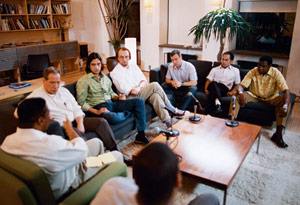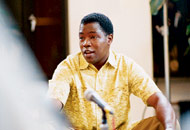
Photo: Andrew French
They dodge, clam up, problem-solve when you just want them to listen, toss off "yes" or "no" answers when you were hoping to go deeper. The eternal question: What is it with them? For the answers, expert Roland Warren enticed this group of strangers into talking about what they don't like, what we don't know about them, and what will always keep them up at night.
Have you ever had a serious sit-down with the man in your life and come away with absolute clarity...that he just didn't get it? The problem may be interplanetary (Can you hear me now, Mars? How about now?), but Roland Warren, president of the National Fatherhood Initiative, proposes that gender communication gaps are really more about style than substance."People have three layers," says Warren, who speaks with thousands of dads, couples, and families each year. "There's a physical, emotional, and spiritual core. Men tend to engage on the physical level, talking about what happened—not doing life deeply, if you will. This frustrates women, who seem wired to move more quickly from the physical to the emotional, where real intimacy happens."
Warren says that although men do dip into the emotional and spiritual layers, they're much less likely than women to volunteer worries or feelings that might make them appear incompetent or weak. So the way to initiate what a woman would call a real conversation, Warren has learned, is to come up with a good opening line. You might think "Honey, we need to talk" is a rather benign way to start a discussion, but men often take it as a signal to put up the heat shields, anticipating a barrage of criticism and complaints. You probably don't want to bring up the affair your husband is having over sandwich-making, says Warren, but that may be the perfect time to discuss child-raising strategies or job issues. The idea is to make conversation a natural part of your relationship, as opposed to an event, capital E.
Warren also recommends losing the yes or no questions; they make it too easy for a man to shut down the discussion. Open-ended questions—like "When you worry, what do you worry about?" or "When are you happiest?"—are more likely to lead into emotional or spiritual territories, which is where you want them to go.
We put Warren's theories to the test. To decode "the enigma that is us," as Warren himself says, we gathered together an elite group of specialists—which is to say, men. (We also made them pose like a gaggle of supermodels before our cameras—but then we laid out two cases of Bud to get them back on an even keel.) With Warren as moderator, we subjected them to a battery of questions about relationships, self-image, and fatherhood. Here's what we learned...
What doesn't the woman in your life know about you?
 Parris Hall: The amount of pressure and concern that I feel regarding my obligation and commitment to our family. We talk about it. But I'm not sure she feels it in the way that I've tried to describe it to her.
Parris Hall: The amount of pressure and concern that I feel regarding my obligation and commitment to our family. We talk about it. But I'm not sure she feels it in the way that I've tried to describe it to her.
Parris Hall, 41, has been married 17 years and has two daughters, 11 and 14.
 Jaime Hardaway: My girlfriend probably doesn't realize how highly I value her opinion.
Jaime Hardaway: My girlfriend probably doesn't realize how highly I value her opinion.
Jaime Hardaway, 29, has been seeing his girlfriend for 4 years. He is also helping to raise his 3-year-old niece.
 Ivan Kronenfeld: My wife should know that I'm occasionally right. [Laughter.]
Ivan Kronenfeld: My wife should know that I'm occasionally right. [Laughter.]
Ivan Kronenfeld, 56, has been married 22 years. He has two stepchildren, 32 and 38; one grandchild, 10.
 Rodrigo Kong: My wife is from Japan—old-school Japan. And so for her, communication is really subtle; omissions are very important and sometimes saying nothing says a lot. I'd like her to know how much effort it takes for me to be quiet. I'm an American, and I want to keep talking and talking and talking.
Rodrigo Kong: My wife is from Japan—old-school Japan. And so for her, communication is really subtle; omissions are very important and sometimes saying nothing says a lot. I'd like her to know how much effort it takes for me to be quiet. I'm an American, and I want to keep talking and talking and talking.
Rodrigo Kong, 29, has been married 2 years.
 Brian Connaughton: There isn't really anything. I think that's an enormous help to our relationship.
Brian Connaughton: There isn't really anything. I think that's an enormous help to our relationship.
Brian Connaughton, 36, has been married 7 years and has a 2 1/2-year-old son.
 René Millán: There's nothing my wife, Sarah Jane, doesn't know, though there are things she will never understand. She may know intellectually that I'm a barrio kid and inner city first-generation Mexican-American, but she won't ever understand what it's like to have grown up in that environment.
René Millán: There's nothing my wife, Sarah Jane, doesn't know, though there are things she will never understand. She may know intellectually that I'm a barrio kid and inner city first-generation Mexican-American, but she won't ever understand what it's like to have grown up in that environment.
René Millán, 30, has been married 8 months.
 Parris Hall: The amount of pressure and concern that I feel regarding my obligation and commitment to our family. We talk about it. But I'm not sure she feels it in the way that I've tried to describe it to her.
Parris Hall: The amount of pressure and concern that I feel regarding my obligation and commitment to our family. We talk about it. But I'm not sure she feels it in the way that I've tried to describe it to her.Parris Hall, 41, has been married 17 years and has two daughters, 11 and 14.
 Jaime Hardaway: My girlfriend probably doesn't realize how highly I value her opinion.
Jaime Hardaway: My girlfriend probably doesn't realize how highly I value her opinion. Jaime Hardaway, 29, has been seeing his girlfriend for 4 years. He is also helping to raise his 3-year-old niece.
 Ivan Kronenfeld: My wife should know that I'm occasionally right. [Laughter.]
Ivan Kronenfeld: My wife should know that I'm occasionally right. [Laughter.] Ivan Kronenfeld, 56, has been married 22 years. He has two stepchildren, 32 and 38; one grandchild, 10.
 Rodrigo Kong: My wife is from Japan—old-school Japan. And so for her, communication is really subtle; omissions are very important and sometimes saying nothing says a lot. I'd like her to know how much effort it takes for me to be quiet. I'm an American, and I want to keep talking and talking and talking.
Rodrigo Kong: My wife is from Japan—old-school Japan. And so for her, communication is really subtle; omissions are very important and sometimes saying nothing says a lot. I'd like her to know how much effort it takes for me to be quiet. I'm an American, and I want to keep talking and talking and talking.Rodrigo Kong, 29, has been married 2 years.
 Brian Connaughton: There isn't really anything. I think that's an enormous help to our relationship.
Brian Connaughton: There isn't really anything. I think that's an enormous help to our relationship. Brian Connaughton, 36, has been married 7 years and has a 2 1/2-year-old son.
 René Millán: There's nothing my wife, Sarah Jane, doesn't know, though there are things she will never understand. She may know intellectually that I'm a barrio kid and inner city first-generation Mexican-American, but she won't ever understand what it's like to have grown up in that environment.
René Millán: There's nothing my wife, Sarah Jane, doesn't know, though there are things she will never understand. She may know intellectually that I'm a barrio kid and inner city first-generation Mexican-American, but she won't ever understand what it's like to have grown up in that environment. René Millán, 30, has been married 8 months.
When do you open up?
 Richard Panek: I have two or three male friends who became close because we've always had that ability to talk. I remember this friend talking about somebody who'd died, and he started crying. I thought, "This is a moment people would normally say is a women's moment." But I appreciated him even more for being able to do that.
Richard Panek: I have two or three male friends who became close because we've always had that ability to talk. I remember this friend talking about somebody who'd died, and he started crying. I thought, "This is a moment people would normally say is a women's moment." But I appreciated him even more for being able to do that.
Richard Panek, 44, has been married 13 years and has two sons, 8 and 12.
Ivan: When you sit around with friends and have a couple of drinks, you tend to talk about your families.
Rodrigo: Since being married, I realized the best times for me aren't always the best times for my spouse. So now it's when we're both ready.
 Roland Warren: A lot of men engage on the physical level, talking about what happened, not on an emotional level.
Roland Warren: A lot of men engage on the physical level, talking about what happened, not on an emotional level.
Roland Warren, the moderator, is the president of the National Fatherhood Initiative.
Brian: But that first layer is loaded with information. The way a guy tells you what happened says a lot about how he feels about what happened.
Parris: I'm enormously comfortable talking about the what. But I'm uncomfortable talking about that next layer down. My kids go to sleep in the safety and security of their parents. My wife goes to sleep in the safety and security of her husband. Do they really want to know that their last line of defense is just as scared as they are?
When there is conflict at home, what does it tend to be about?
René: "When one of us has been too quick to react negatively. When we've taken something personally.
Brian: More than anything, it's about different approaches to solving problems.
Parris: Parenting. My wife has a relatively stern, conservative approach, similar to the way she was raised: Parents make decisions and children follow. I think, "If you have an opinion, I want to hear it."
Richard: Cleaning up. I always maintain that if you pick up after yourself, the place can stay in some reasonable order. Other people in the household agree in principle but can't seem to follow through.
 Richard Panek: I have two or three male friends who became close because we've always had that ability to talk. I remember this friend talking about somebody who'd died, and he started crying. I thought, "This is a moment people would normally say is a women's moment." But I appreciated him even more for being able to do that.
Richard Panek: I have two or three male friends who became close because we've always had that ability to talk. I remember this friend talking about somebody who'd died, and he started crying. I thought, "This is a moment people would normally say is a women's moment." But I appreciated him even more for being able to do that. Richard Panek, 44, has been married 13 years and has two sons, 8 and 12.
Ivan: When you sit around with friends and have a couple of drinks, you tend to talk about your families.
Rodrigo: Since being married, I realized the best times for me aren't always the best times for my spouse. So now it's when we're both ready.
 Roland Warren: A lot of men engage on the physical level, talking about what happened, not on an emotional level.
Roland Warren: A lot of men engage on the physical level, talking about what happened, not on an emotional level. Roland Warren, the moderator, is the president of the National Fatherhood Initiative.
Brian: But that first layer is loaded with information. The way a guy tells you what happened says a lot about how he feels about what happened.
Parris: I'm enormously comfortable talking about the what. But I'm uncomfortable talking about that next layer down. My kids go to sleep in the safety and security of their parents. My wife goes to sleep in the safety and security of her husband. Do they really want to know that their last line of defense is just as scared as they are?
When there is conflict at home, what does it tend to be about?
René: "When one of us has been too quick to react negatively. When we've taken something personally.
Brian: More than anything, it's about different approaches to solving problems.
Parris: Parenting. My wife has a relatively stern, conservative approach, similar to the way she was raised: Parents make decisions and children follow. I think, "If you have an opinion, I want to hear it."
Richard: Cleaning up. I always maintain that if you pick up after yourself, the place can stay in some reasonable order. Other people in the household agree in principle but can't seem to follow through.
How are conflicts resolved to your greatest satisfaction?
Rodrigo: We'll have it out, and then I'll start making funny faces at her, and there's this spot on her neck where I like to put my head. That's usually the clincher.
René: Before Sarah Jane, my communication in relationships was nil. I would never tell people I had a problem with something; I never wanted to rock the boat. With Sarah Jane, I feel safe. If she's done something to hurt my feelings, I can tell her about it. And it'll be okay.
Brian: Keep talking until you get it fixed or get to an understanding. Not that patronizing "Yeah, yeah, I getcha."
Richard: It really is about the other person acknowledging that you have a good or valid point. Not necessarily that they agree with you. I always think that's the breakthrough, when they say, 'I get it.' I can go away and think about it and try to apply that next time.
How are you and your wife or girlfriend most different?
Rodrigo: My wife has an enormous amount of patience, and she always assumes the best of people, whereas I'm a little more cautious. People come to the house, i ask them for their IDs: "Sure, you're from Con Edison—show me some ID."
Jaime: She puts her stock in people a bit more than I do. I'm not going to get my emotions tied up if someone doesn't come through for me.
Brian: How we handle crises. Professional or personal, I put my head down and barrel through it. She blows it off or forgets about it or runs away from it.
Richard: She's probably more forgiving of other people's behavior.
Ivan: I'm more trusting of people and life in general, and therefore more disappointed. Anne tends to be more skeptical and even-keeled than I am. One of the great mistakes of our time is that we try to deal with each other as though we're the same. Men are men; women are women. As you get older, you appreciate that we're wired differently.
What do you get from her that you get nowhere else?
Ivan: As Willy Loman says in Death of a Salesman, she's my foundation. she's my rock and my foundation.
René: My four older brothers and my parents don't understand my career and my passion for being an artist. Sarah Jane knows; she is so on my team.
Brian: Complete, 100 percent, absolute acceptance and trust and love. I may have a memory lapse in the heat of battle, but I don't doubt that she wants what's best for me.
Rodrigo: I get the feeling of inexhaustible, abundant patience and acceptance. I might do things that are questionable to her, but she believes I'm a good person and that my motivation came from a good place.
Richard: Almost total understanding and the expectation it'll be reciprocated—that I'll understand what she says with only the barest of clues.
Rodrigo: We'll have it out, and then I'll start making funny faces at her, and there's this spot on her neck where I like to put my head. That's usually the clincher.
René: Before Sarah Jane, my communication in relationships was nil. I would never tell people I had a problem with something; I never wanted to rock the boat. With Sarah Jane, I feel safe. If she's done something to hurt my feelings, I can tell her about it. And it'll be okay.
Brian: Keep talking until you get it fixed or get to an understanding. Not that patronizing "Yeah, yeah, I getcha."
Richard: It really is about the other person acknowledging that you have a good or valid point. Not necessarily that they agree with you. I always think that's the breakthrough, when they say, 'I get it.' I can go away and think about it and try to apply that next time.
How are you and your wife or girlfriend most different?
Rodrigo: My wife has an enormous amount of patience, and she always assumes the best of people, whereas I'm a little more cautious. People come to the house, i ask them for their IDs: "Sure, you're from Con Edison—show me some ID."
Jaime: She puts her stock in people a bit more than I do. I'm not going to get my emotions tied up if someone doesn't come through for me.
Brian: How we handle crises. Professional or personal, I put my head down and barrel through it. She blows it off or forgets about it or runs away from it.
Richard: She's probably more forgiving of other people's behavior.
Ivan: I'm more trusting of people and life in general, and therefore more disappointed. Anne tends to be more skeptical and even-keeled than I am. One of the great mistakes of our time is that we try to deal with each other as though we're the same. Men are men; women are women. As you get older, you appreciate that we're wired differently.
What do you get from her that you get nowhere else?
Ivan: As Willy Loman says in Death of a Salesman, she's my foundation. she's my rock and my foundation.
René: My four older brothers and my parents don't understand my career and my passion for being an artist. Sarah Jane knows; she is so on my team.
Brian: Complete, 100 percent, absolute acceptance and trust and love. I may have a memory lapse in the heat of battle, but I don't doubt that she wants what's best for me.
Rodrigo: I get the feeling of inexhaustible, abundant patience and acceptance. I might do things that are questionable to her, but she believes I'm a good person and that my motivation came from a good place.
Richard: Almost total understanding and the expectation it'll be reciprocated—that I'll understand what she says with only the barest of clues.
What would she love you to do more of?
Rodrigo: Relax.
René: Take a compliment without blushing.
Brian: Not think about work. Do laundry. Or something purely creative.
Richard: Do my work without agonizing.
Ivan: Lighten up. it's rough out there, and I let it get to me a little too much. Many guys my age have been laid off, or their companies have folded. I wouldn't know how to live without being a productive person and bringing home a paycheck. For me it's inexorably linked to holding your head up.
Parris: Be more supportive. Sometimes I don't agree with her about how we should parent, and she sees that as not being supportive.
Jaime: Save money.
What makes you a man?
Parris: What makes you a man is being responsible and accountable.
Brian: Achieving any kind of goal.
Richard: This is going to sound so Zen, but you know you're a man when you don't have to ask the question anymore, when it's not important.
Ivan: It's when you have an ideal that you're willing to die for. Your family, your god, your country.
René: Never hiding behind this wall of macho manliness.
Jaime: When my sister had her child, we wanted her to finish school. So I stayed home for almost a year after my niece was born. It made me realize that things don't always come exactly when you want them to come. It humbled me, as someone who grew up and was taught: You go to school, you go out and work. I thought I should be making more money, but this was the thing that needed to be done. So I'd say becoming a man is when you understand you shouldn't feel any less of a man because you're taking care of a child.
Richard: And then again, maybe it's just when you read a map right. [Laughter]
Roland: No, that's when you're a wo-man. [Laughter]
Rodrigo: Relax.
René: Take a compliment without blushing.
Brian: Not think about work. Do laundry. Or something purely creative.
Richard: Do my work without agonizing.
Ivan: Lighten up. it's rough out there, and I let it get to me a little too much. Many guys my age have been laid off, or their companies have folded. I wouldn't know how to live without being a productive person and bringing home a paycheck. For me it's inexorably linked to holding your head up.
Parris: Be more supportive. Sometimes I don't agree with her about how we should parent, and she sees that as not being supportive.
Jaime: Save money.
What makes you a man?
Parris: What makes you a man is being responsible and accountable.
Brian: Achieving any kind of goal.
Richard: This is going to sound so Zen, but you know you're a man when you don't have to ask the question anymore, when it's not important.
Ivan: It's when you have an ideal that you're willing to die for. Your family, your god, your country.
René: Never hiding behind this wall of macho manliness.
Jaime: When my sister had her child, we wanted her to finish school. So I stayed home for almost a year after my niece was born. It made me realize that things don't always come exactly when you want them to come. It humbled me, as someone who grew up and was taught: You go to school, you go out and work. I thought I should be making more money, but this was the thing that needed to be done. So I'd say becoming a man is when you understand you shouldn't feel any less of a man because you're taking care of a child.
Richard: And then again, maybe it's just when you read a map right. [Laughter]
Roland: No, that's when you're a wo-man. [Laughter]
What do you worry most about?
Richard: My work. Getting it done and done to my own impossibly high standards.
Jaime: As someone who's about to take that next step into marriage, I think about the responsibilities of being a provider, a husband, and later a father. My girlfriend has a great relationship with her father. I respect him, so I want to be all those things that he was. I want her to be able to count on me. I worry, "Can I deliver the goods?"
Brian: My ability to provide a secure world for my family.
Ivan: The health of my wife, and being able to stay economically viable as I get old. You can say 60 is young, but my ability to play for the Dodgers is greatly diminished.
René: I was taught that to be a man was to be a provider. And I spent the last year being supported by my wife. The pressure to provide, the wanting to give her the world and not being able to—that wasn't the easiest thing.
Parris: I don't really worry about finances; I worry about being able to fulfill our dreams. When we come through this—raising children, finishing our professional lives—will my wife and I have the quality of relationship we want to have?
What's your vision for the future?
Ivan: I'd like to see my kids and my grandchild have three values: no lying, no whining, and be good to other people. If they could put that into their daily lives, I'd be real, real proud of them and real proud that I had something to do with that.
Rodrigo: I grew up in a rather strict moral environment, and I wanted to get away from that. Now I realize how important morals and ethics are. My vision is that my wife and I have a similar belief system that underpins and supports what we do.
Jaime: Some guys have more respect for their best friend than for their mate. But my vision is for my girlfriend and me to be extremely communicative, start building that foundation now, and understand that we are going to have disagreements.
René: When I'm on my deathbed, I want to know that I didn't let one second go by without her knowing how much she is in my heart and in my mind.
Richard: We don't think long-term. We've changed so much that we're not the people we were when we got married, but we've maintained the same level of closeness. So we just say, "Okay, we'll take a little bit at a time and enjoy the ride."
Brian: We had a trying first year of marriage, and there was a little breakdown in communication where resentment built up and we weren't talking. If we have a mantra, it's "If we're talking, we're doing okay."
Parris: I'm a pretty spiritual person, so my wife and I just want to make sure that we've been good stewards of God's magnitude.
Esquire editor-in-chief David Granger answers women's frequently asked questions
Richard: My work. Getting it done and done to my own impossibly high standards.
Jaime: As someone who's about to take that next step into marriage, I think about the responsibilities of being a provider, a husband, and later a father. My girlfriend has a great relationship with her father. I respect him, so I want to be all those things that he was. I want her to be able to count on me. I worry, "Can I deliver the goods?"
Brian: My ability to provide a secure world for my family.
Ivan: The health of my wife, and being able to stay economically viable as I get old. You can say 60 is young, but my ability to play for the Dodgers is greatly diminished.
René: I was taught that to be a man was to be a provider. And I spent the last year being supported by my wife. The pressure to provide, the wanting to give her the world and not being able to—that wasn't the easiest thing.
Parris: I don't really worry about finances; I worry about being able to fulfill our dreams. When we come through this—raising children, finishing our professional lives—will my wife and I have the quality of relationship we want to have?
What's your vision for the future?
Ivan: I'd like to see my kids and my grandchild have three values: no lying, no whining, and be good to other people. If they could put that into their daily lives, I'd be real, real proud of them and real proud that I had something to do with that.
Rodrigo: I grew up in a rather strict moral environment, and I wanted to get away from that. Now I realize how important morals and ethics are. My vision is that my wife and I have a similar belief system that underpins and supports what we do.
Jaime: Some guys have more respect for their best friend than for their mate. But my vision is for my girlfriend and me to be extremely communicative, start building that foundation now, and understand that we are going to have disagreements.
René: When I'm on my deathbed, I want to know that I didn't let one second go by without her knowing how much she is in my heart and in my mind.
Richard: We don't think long-term. We've changed so much that we're not the people we were when we got married, but we've maintained the same level of closeness. So we just say, "Okay, we'll take a little bit at a time and enjoy the ride."
Brian: We had a trying first year of marriage, and there was a little breakdown in communication where resentment built up and we weren't talking. If we have a mantra, it's "If we're talking, we're doing okay."
Parris: I'm a pretty spiritual person, so my wife and I just want to make sure that we've been good stewards of God's magnitude.
Esquire editor-in-chief David Granger answers women's frequently asked questions




